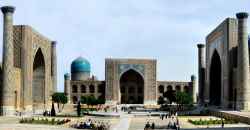
The war in Ukraine favors Beijing in trade with Moscow
For the first time since the war in Ukraine began, Xi Jinping and Putin met officially in Uzbekistan It was the Chinese leader who ran the game. He agreed the sanctions that the US and the EU imposed and at the same time proclaimed a “friendship without limits” between the two countries. A very useful friendship for the Dragon, hungry for energy. Actually, China buys oil, coal and rare minerals from Moscow at almost symbolic prices. Compared to August (a year ago), Chinese spending in Russia increased by around 60%. But Putin’s army is in serious difficulty in Ukraine: The Russian leader also suffers from the devastating internal economic crisis, a waning popular consensus and a creeping showdown at the top.
No weapons in Moscow
However, the Sino-Russian “cordial understanding” is not a military alliance: no weapons in Moscow. If things keep on this way, the Kremlin risks coming under the orbit of China, which has a 10 times larger economy and expanding foreign trade. The yuan has become a common currency in international transactions that Russia still has, increasing its importance in competition with the dollar. For Chinese exporters to Russia, war is a source of incredible growth: the total share of goods traveling to the lands of Tsar Vladimir had increased from April to June from 50% to 70%. A real boon for the other half of the sky.
Moscow and North Korea
But no military aid to Moscow, forced to ask for it from little North Korea. Beijing’s economic interests limit the previously declared “friendship without limits“. And this is bound to be a checkmate for the Putinians in Moscow and an also encouragement for the opposition that is plotting in the shadows in the Kremlin. Kissinger – like Merkel – has declared that he would have preferred a European Russia to a Chinese Russia, but the story seems to slide in the opposite direction.
In the three-way match, Russia is about to play a supporting role
But Chinese military experts are not sleeping soundly. If Russia were severely defeated by the war and a regime change followed, the US could deploy its mighty war machine undisturbed in the Far East and the waters of the Taiwan Canal would become increasingly warm. In short, a very dangerous risk in which Beijing could not invoke any external help.
________________________________________________________________________
La guerra in Ucraina favorisce Pechino negli scambi con Mosca
Xi Jinping e Putin si sono incontrati faccia a faccia in Uzbekistan per la prima volta dall’inizio della guerra in Ucraina. Inutile dire che è stato il leader cinese a condurre il gioco. Ha rispettato le sanzioni disposte dagli Usa e dalla UE mentre proclamava fra Cina e Russia una «amicizia senza limiti». Un’amicizia molto conveniente per il Dragone, affamato di energia, che compra da Mosca petrolio, carbone e minerali rari a prezzi quasi simbolici. Rispetto ad agosto di un anno fa la spesa cinese in Russia è aumentata del 60% circa. La poltrona che occupa Putin al summit è decisamente più scomoda, con l’esercito in gravi difficoltà in Ucraina, una crisi economica interna devastante, un consenso popolare calante e una strisciante resa dei conti al vertice.
L’”intesa cordiale” sino-russa tuttavia non è un’alleanza militare: niente armi a Mosca
Se le cose vanno avanti così il Cremlino rischia di entrare sotto l’orbita della Cina che ha una economia 10 volte maggiore e un commercio estero in espansione. Lo yuan è diventato moneta di uso comune nelle transazioni internazionali che la Russia ancora intrattiene, accrescendone l’importanza nella concorrenza col dollaro. Per gli esportatori cinesi verso la Russia la guerra è una fonte di crescita incredibile: la quota totale di merci che viaggia verso le terre dello zar Vladimir era aumentata dall’aprile al giugno dal 50% al 70%. Una vera manna che cade nell’altra metà del cielo.
Mosca si avvicina alla Cina e chiede aiuto alla Corea del Nord
Ma niente aiuti militari a Mosca, costretta a chiederli alla piccola Corea del Nord. Gli interessi economici di Pechino limitano l’«amicizia senza limiti» precedentemente dichiarata. Uno scacco per i putiniani moscoviti e un incoraggiamento per l’opposizione che trama nell’ombra al Cremlino. Kissinger – come la Merkel – ha dichiarato che avrebbe preferito una Russia europea a una Russia cinese, ma la storia sembra scivolare in senso opposto.
Nella partita a tre la Russia si avvia a svolgere un ruolo da comprimaria
Ma gli esperti militari cinesi non dormono sonni tranquilli. Se la Russia uscisse duramente sconfitta dalla guerra e se a ciò seguisse un cambio di regime, gli Usa potrebbero schierare indisturbati la loro poderosa macchina bellica in Estremo Oriente e le acque del Canale di Taiwan diventerebbero sempre più calde. Insomma un Risiko pericolosissimo nel quale Pechino non potrebbe invocare alcun aiuto esterno.
Leggi anche: L’autorevolezza di Putin va scemando







